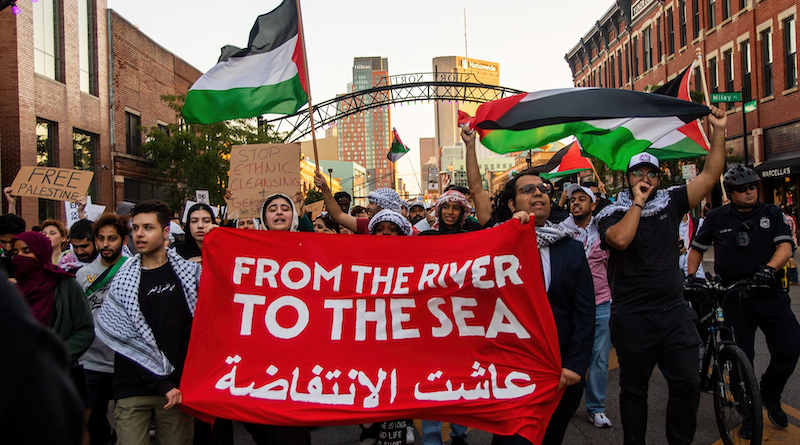
To those born in the 20th century, the phrase “Never Forget” carries an entirely different meaning than it does today. Back then, the rallying cry was most associated with the Holocaust. Today, it is linked to the events that took place on Sept. 11, 2001. When pro-Palestinian protestors on college campuses chant, “From the river to the sea, Palestine will be free,” one wonders how many young people could tell you what river and what sea? Do they understand it as a fierce antisemitic call to eradicate Israel and its people from the Holy Land? For that matter, how many would be able to define the word Holocaust? If education is the key to knowledge, then young Americans rallying on behalf of the pro-Palestinian cause are sorely lacking.
Sadly, it’s not just school-age students who lack a basic understanding of what happened during World War II and why. A 2020 study revealed 23% of US adults between the ages of 18-39 put the Holocaust in one of these three categories: It was a myth, it had been exaggerated, or they didn’t know. The report also found: “Nearly one-third of all Americans (31 percent) and more than 4-in-10 Millennials (41 percent) believe that substantially less than 6 million Jews were killed (two million or fewer) during the Holocaust.” These statistics were generated by a Holocaust Knowledge and Awareness Study conducted by the Conference on Jewish Material Claims Against Germany.
The above statistics result from a national look at American knowledge and understanding of World War II. The findings were even more scandalous when they drilled down to the state level. “The state-by-state analysis yielded a particularly disquieting finding that nearly 20 percent of Millennials and Gen Z in New York feel the Jews caused the Holocaust.”
As of June 2022, 23 states have laws mandating that the Holocaust be taught in school. However, the level of instruction is a mixed bag. In Michigan, for instance, the state legislature requires a mere six hours of course work dedicated to the topic of “genocide.” At the other end of the educational spectrum lies Florida. The Sunshine state has one of the most robust educational curricula on the topic. In 1994, the state legislature passed a statute that required the teaching of the Holocaust in all state school districts. It reads, in part:
“The history of the Holocaust (1933-1945), the systematic planned annihilation of European Jews and other groups by Nazi Germany, a watershed event in the history of humanity, to be taught in a manner that leads to an investigation of human behavior, an understanding of the ramifications of prejudice, racism, and stereotyping, and an examination of what it means to be a responsible and respectful person, for the purposes of encouraging tolerance of diversity in a pluralistic society and for nurturing and protecting democratic values and institutions.”
Pro-Palestinian Sentiment and Diversity Education
More recently, teaching American children about the Holocaust is getting muddled in a quagmire of concern over new culture war laws that ban “divisive” topics like “implicit bias and systemic racism.” New Hampshire is one state where educators are feeling the heat in trying to teach students about the Holocaust while having to avoid the so-called divisive topics. Kimberly Kelliher has taught social studies in New Hampshire for over two decades and finds the new laws working at cross purposes. In an article in the Hechinger Report, an educational non-profit organization, Kelliher revealed her anxiety:
“The Holocaust is not a single event. It is a series of attitudes and actions that led to an atrocity. When we look at the divisive concepts law, if we are denying people from talking about certain things, then we’re not honestly talking about the attitudes and actions.”
New Hampshire holocaust and genocide scholar Tom White backs up Kelliher’s concern. “You can’t teach about Nazi perpetrators without teaching about implicit bias. You just can’t do it. What motivates the perpetrator?”
Still, one cannot fault the recent culture wars raging in education for Americans’ ignorance of the Holocaust. This has been a long time coming. And it cannot be forgotten that another 27 or so states do not mandate the teaching of the Jewish genocide that occurred during World War II. It’s entirely possible some teachers still bring it up in the classroom, but if what we see today in terms of pro-Palestinian protests is any indication, the message and reality of the Holocaust has not penetrated their young minds in any meaningful way.
Nobel laureate and Holocaust survivor Elie Wiesel – who miraculously lived to the ripe age of 87 – once intoned: “Young people want to learn, they are thirsty for knowledge, they want to understand and remember.” It is a sad state of affairs that the American education system has let down so many by teaching the reality of the Holocaust to so few.
